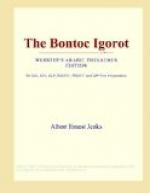The Ilokano language was the more readily adopted, since it is of Malayan origin, and is heard west of the Igorot with increasing frequency until its home is reached on the coast. Among the Ilokano words common in the language of commerce are the following:
Ma’-no, how much; a-sin’, salt; ba’-ag, breechcloth; bu-ya’-ang, black; con-di’-man, red; fan-cha’-la, blanket, white, with end stripes; pas-li-o’, Chinese bar iron from which axes, spears, and bolos are made; ba-rot’, brass wire; pi-nag-pa’-gan, a woman’s blanket of distinctive design.
An Americanism used commonly in commercial transactions in the area, and also widely in northern Luzon, is “no got.” It is an expression here to stay, and its simplicity as a vocalization has had much to do with its adoption.
Stages of commerce
The commerce of the Igorot illustrates what seems to be the first distinctively commercial activity. Preceding it is the stage of barter between people who casually meet and who trade carried possessions on the whim of the moment. If we wish to dignify this kind of barter, it may properly be called “Fortuitous Commerce.”
The next stage, one of the two illustrated by the Igorot of the Bontoc culture area, is that in which commodities are produced before a widespread or urgent demand exists for them in the minds of those who eventually become consumers through commerce. Such commodities result largely from a local demand and a local supply of raw materials. Gradually they spread over a widening area, carried by their producers whose home demand is, for the time, supplied, and who desire some commodity to be obtained among another people. Such venders never or rarely go alone to exchange their goods, which, also, are seldom produced by simply one person, but by a number of individuals or a considerable group. The motive prompting this commerce is the desire on the part of the trader to obtain the commodity for which he goes. In order to obtain it in honor, he attempts to thrust his own productions on the others by carrying his commodities among them. Commerce in this stage may be called “Irregular Intrusive Commerce.” It also has its birth and development in barter.
A higher stage of commerce, an immediate outgrowth of the preceding, is that in which the producer anticipates a known demand for his commodity, and at irregular times carries his stock to the consumers. This commerce may be called “Irregular Invited Commerce.” It is in this stage that a medium of exchange is likely to develop. This class of commerce is also in full operation in Bontoc to-day.




